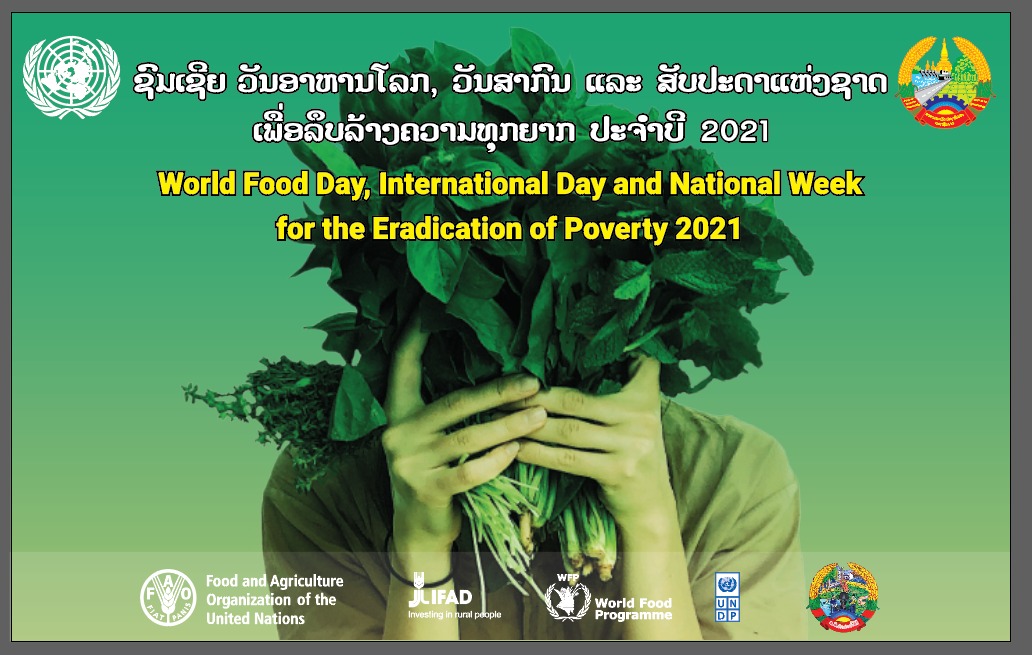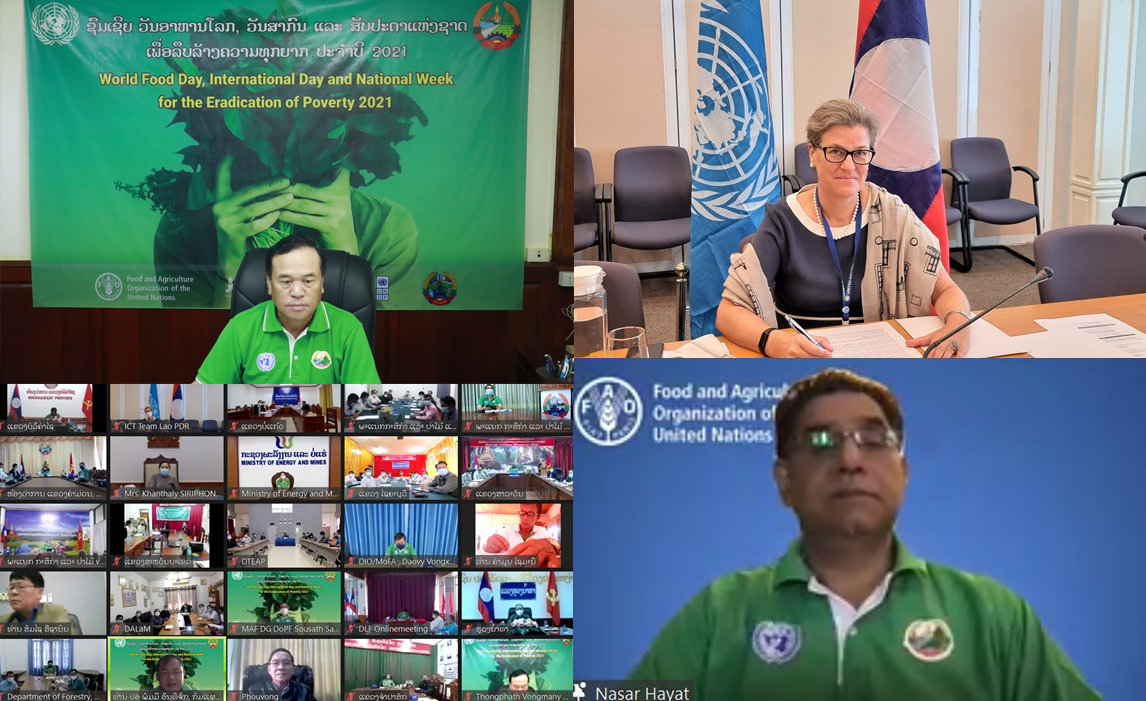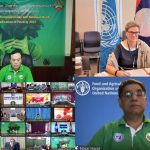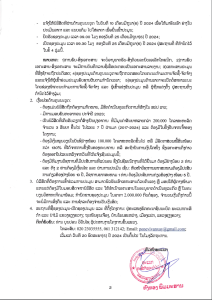Celebrate World Food Day, International Day, and National Week for the Eradication of Poverty 2021.

On October 25, 2021, the Ministry of Agriculture and Forestry hosted an online event World Food Day, International Day, and National Poverty Alleviation Week 2021 in partnership with the Food and Agriculture Organization of United Nations (FAO) and the UN in Lao PDR Country Team.
World Food Day 2021 was held virtually under the theme: “Our actions are our future.” Better Production, Better Nutrition, Better Environment, and Better Life.”
The theme “Ending Progress Together: End Prolonged Poverty, Respect for All, and Our World” served as the focus for International Day and National Week for the Eradication of Poverty.
H.E. Mr. Thongphath Vongmany, Deputy Minister of Ministry of Agriculture and Forestry (MAF), chaired the online event joined by U.N. Resident Coordinator (UNRC) in Lao PDR Ms. Sara Sekkenes and Food and Agriculture Organization of the United Nations (FAO) Country Representative to Lao PDR Mr. Nasar Hayat.
Heads of Departments, Departments, Institutions, Ministries, the United Nations and Development Partners, the Provincial Department of Agriculture and Forestry, Vientiane Capital, stakeholders, and invited guests were among some 326 participants.

H.E. Mr. Thongphath said MAF had adopted online events to conduct actions to avoid and control the COVID-19 outbreak in 2021.
“To mark World Food Day and Memorial Day International Week National Poverty Eradication this year, it is critical to raise awareness and knowledge so that people around the world understand the challenges and are alert, mobilize forces in society and the international community to monitor, prevent damage that may occur together, and repair the consequences of disasters, natural outbreaks of disease, and challenges so that life can return to normal as soon as possible.”
These annual events bring together the international community and governments worldwide to promote awareness and action for those who suffer from hunger, malnutrition, and poverty and giving prominence to this year’s shared vision and theme of Recovering Better for an Equitable and Sustainable World. Despite the challenges, Mr. Thongphath said Lao PDR had proceeded successfully in the achievement of some agriculture related targets including those in the 8th National Socio-Economic Development Plan approved at the 11th Party Congress.
As COVID-19 continues to cause havoc to the health, nutrition, lives, and livelihoods of hundreds of millions of people across the world’s largest region, it has also offered an opportunity to rebuild a global, agri-food system that was already not fit for purpose in providing proper nutrition for the masses, Ms. Sekkenes said.
“Today’s event presents an opportunity to focus our attention on individual capacity as agents of transformative and sustainable change.”
“A healthy population, making healthy choices, is key to the development of any country — and in Lao PDR with the eradication of poverty.”
“Whether a farmer, and producer, or member of the public, civil society or consumer, national or international civil servant, we all have a role to play in the transformation of food systems and poverty eradication.”
Mr. Nasar Hayat said: “We can all be food heroes and join the multitude who have continued to produce, plant, harvest, fish, or transport our food, despite these challenging times. We can choose to enable and facilitate people to eat nutritious, environmentally friendly foods at affordable prices and fair prices for smallholder food producers. As producers, distributors, or consumers, we each have the power to make a positive impact on the transformation. Our actions are the future.”
Poverty and starvation have long been substantial worldwide issues. The United Nations declared FAO’s 1945 establishment date of October 16 as World Food Day in 1980.
Since 1992, the United Nations named October 17 as International Day for the Eradication of Poverty. The Government of Lao PDR declared October 17-24 as National Week for the Eradication of Poverty in 2003.
In Lao PDR, the number of infected people is increasing throughout the country, which has directly affected and caused significant damage to the nation’s life, economy, and society, particularly in economic sectors such as agriculture and forestry, services, and trade, slowing employment, and tourism.
The agriculture and forestry sectors were able to achieve outstanding results in the last five years, in particular:
Paddy rice at an average of 3.7 million tons per year, compared to the plan an increase by 8%, with sufficient capacity to meet domestic consumption and set aside a surplus; Livestock and fisheries have continued to increase at a pace of 4.2-4.7 percent per year, with domestic meat consumption reaching 65 kg per person per year; crop output of 4 billion USD (average 0.8 billion USD / year) has more than quadrupled compared to prior years; Large cattle and buffalo exports totaled $170 million.
Larger farms have become a factor in the process of raising livestock, while target groups have become more aware of the application of techniques in animal husbandry and the management of small-scale family farms.
Rural development and poverty alleviation efforts continue as a continuous process and have been successful in many areas.
The goals of alleviating poverty and hunger and targets require coordination between government, private businesses, international organizations, social groups, and farmers throughout the country.
He said proactive measures must be taken to effectively pay attention to and implement the orders of the Party Central Committee on increasing the effectiveness in implementing responsibilities in directing and leading prevention and response to natural disasters, as well as the Prime Minister’s order on the implementation of the “eight measures.”
Held annually to present and promote concrete actions that address poverty and destitution, the occasions call for action to ensure healthy, sustainable, affordable, and accessible nutrition to all.
World Food Day 2021 has been held worldwide amid the impact of the COVID-19 pandemic on the global food systems, the loss of livelihoods, increased food insecurity and inequality, and consequently the need to recover and sustainably transform agri-food systems.
It comes as the ways the world currently consumes and wastes food exacts a heavy toll on our planet, putting pressure on our natural resources, environment, and climate and depriving those who have less. Unsustainable food production is short-sighted as it degrades or destroys natural habitats, decreases land productivity, and contributes to long-term food insecurity.The status quo exacts a human cost through exposing and expanding inequalities and injustices and a financial cost running into trillions of dollars. With more than 3 billion people (almost 40% of the world’s population) unable to afford a healthy diet, obesity is on the rise in all regions calling for all to do better to turn around the trends.








